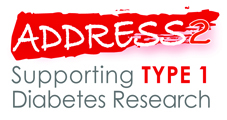Finding sufficient numbers of people who are willing and able to take part in research into type 1 diabetes soon after a life-changing diagnosis is challenging.
How ADDRESS-2 is helping
On joining ADDRESS-2 participants register their interest in hearing about other opportunities to take part in type 1 diabetes research.
They consent to be contacted about research studies for which they might be eligible by the central ADDRESS-2 team at Imperial College London, or the local research team at the site where they joined ADDRESS-2. They know that they are free to say ‘yes’ or ‘no’ to any study.
ADDRESS-2 participants newly diagnosed with type 1 diabetes are suited to clinical trials and research studies in new-onset type 1 diabetes, and this is our main focus. With time, participants become eligible for research studies in established diabetes and we support this too. Siblings may be suited to research studies to prevent type 1 diabetes or to understand its development.
We are working with a number of researchers seeking candidates for their studies
Prof Colin Dayan and Prof Mark Peakman used ADDRESS-2 to find candidates for the MonoPepT1De study, a phase 1 clinical trial of a potential immunotherapy to halt damage to pancreatic beta cells in new-onset type 1 diabetes using proinsulin peptide. Here, they explain how ADDRESS-2 is helping to meet the challenge of recruiting to trials:
“If you want to prevent people losing their insulin making cells; that happens in the first 5 years and particularly in the first 6 months. So we can’t just look at all our patients with type 1 diabetes and invite them to take part in this kind of research, we have to wait for new cases to be diagnosed, and that could be very slow: if we pull just from Cardiff for example where I work then we are only going to get 20-30 newly diagnosed patients a year, but if you pull from across the country we are talking about several hundred a year and that makes it much more possible to do this kind of research.”
Prof Colin Dayan, Cardiff University
Professor of Clinical Diabetes & Metabolism and Consultant Physician
“By having an infrastructure across the country that is recruiting at multiple sites (ADDRESS-2), we have a better chance of getting through the studies quickly, learning from them, establishing the next study and moving on with knowledge.”
Prof Mark Peakman, King’s College London
Professor of Clinical Immunology
We are currently working with Dr Jake Powrie and Prof Mark Peakman to find candidates for the next stage of this peptide immunotherapy research; Multipeptide (www.multipeptide.co.uk). More than 50% of ADDRESS-2 participants matching the study criteria and contacted by the central team have responded and agreed to be referred to the MultiPepT1De team to discuss entering the trial.
